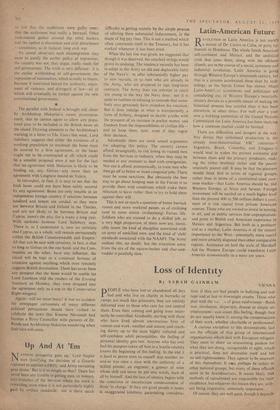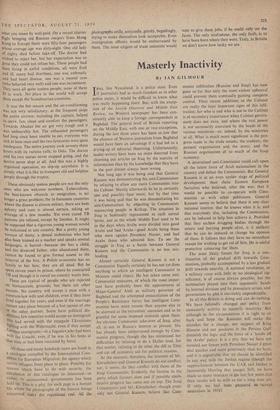Loss of Identity
By SARAH GAINHAM VIENNA
EOPLE who have lost or abandoned all they r had and who live on charity in barracks or camps are much like prisoners; they are entirely delivered over to those who care for and control them. Even their coming and going must neces- sarily be controlled. Gradually, starting with those who have lived almost unconscious lives of custom and work, weather and season, and reach- ing slowly up to the most highly cultured and self-confident adult personalities, the feeling of personal identity gets lost. Anyone who has ever had his passport taken off him in a hostile country knows the beginning of this feeling. In the end it is hard to prove even to oneself that number so- and-so was once a man with the authority of a skilled printer, an engineer, a grower of wine whose skill can never be put into words, least of all by himself. And the loss of identity begins with the conscious or unconscious condescension of those 'in charge.' If they are good people it issues in exaggerated kindness, painstaking considera-
tion; if they are bad people in bullying and red- tape and.at last in downright cruelty. Those who deal with the va:, of great misfortunes—flood, war, revolution, shipwreck, disease or simple un- employment-can count this feeling, though they do not usually know it, among the compensations of their work, whether charitable or professional.
A curious exception to this demonstrable fact are the officials of that group of international organisations which' deal with European refugees. They seem to share an unassuming passion for what they are doing, recognisable at sight, which is practical, does not dramatise itself and has no self-righteousness. They appear to be unaware of this themselves. It may perhaps be unfair to other national groups, but many of these officials seem to be Scandinavians. It seems likely that methods of recruitment are 'responsible for their excellence, but whatever the reason they are, with- out being impressive, extremely impressive.
Of course, they are well-paid, though it depends
what you mean by well-paid. On a recent charter flight bringing old Russian émigrés from Hong Kong to Europe there were fifty-four passengers Whose average age was sixty-eight. One old lady Of eighty died before take-off. The doctor had wished to reject her, but her expectation was so great they could not refuse her. These people had been living in awful conditions, all were frail and ill, many had diarrhea, one was asthmatic and had heart disease, one was a mental case (who behaved very well) and one was incontinent. They were all quite useless people, none of them fit to work. No place in the world will accept them except the Scandinavian countries.
It was the hot season and the air-conditioning was not very satisfactory; at the frequent stops the entire aircrew, including the captain, helped to serve, fan, clean and comfort the passengers. Towards Abadan the air got very rough and it Was unbearably hot. The exhausted passengers had long since been unable to eat, everyone was sick at least once and the two lavatories were quite inadequate. The entire journey took seventy-three hours with its various calls, to Oslo. The doctor and his two nurses never stopped going, and the doctor never slept at all. And this was a highly organised operation, no slip-up anywhere. It is simply what it is like to transport old and helpless People through the tropics.
These obviously useless people are not the only ones who are welcome nowhere. Tuberculosis, the best-known obstacle to emigration, is no longer a great problem; for in fortunate countries where the disease is almost extinct, there are beds aplenty and cure is almost certain, taking an average of a few months. Yet even cured TB patients are refused, except by Sweden. It might be supposed that a vigorous young woman would be welcomed in any country. But a pretty young Woman of thirty, a dental technician who had also been trained as a teacher and speaks several languages, is barred—because she has a child, and his divorced father, who abandoned them, cannot be found to give formal assent to the removal of the boy. A Polish economist has no family to bar him; they are all dead. But he spent eleven years in prison, where he contracted TB and though it is cured no country wants him.
These are typical of people who are rejected on bureaucratic grounds; but there are other reasons. No country will accept a man with a common-law wife and children, even if they have lived together for years, and even if the marriage cannot take place because of a lost spouse of one or the other partner. Some have political dis- abilities; few countries would accept an immigrant who had served with the renegade Ukrainians fighting with the Wehrmacht, even if they accept Lerman immigrants—or a Jugoslav who had been with the Ustashi, even if he was in his teens at that time or had been recruited by force.
All these and many hundreds more are listed in a catalogue compiled by the International Com- mittee for European Migration, the agency which moves refugees from place to place. Possibly for reasons which have to do with security, the circulation of this catalogue to interested—or rather, to uninterested—governments has been held up. This is a pity, for each page is a human life where the photographs of the human beings concerned make the repetitions real. All the photographs smile, anxiously, grimly, beguilingly, trying to make themselves look acceptable. Even immigration officers would be embarrassed by them. The most exigent of trade unionists would vote to give them jobs, if he could only see the faces. The only misfontune, the only fault, is to have been born where they were. Truly, in Britain we don't know how lucky we are.



































 Previous page
Previous page